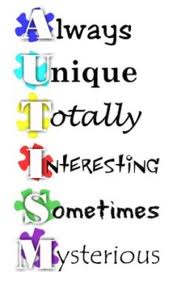Symptoms and Treatment
It is a range of problems that can affect a person's communication skills, social skills, and intelligence. The degree of autism varies from mild to severe.Severely afflicted patients can have a profound intellectual disability. Autism Spectrum Disorders (ASD) can cause severe and pervasive impairment in thinking, feeling, language, and the ability to relate to others. These disorders are usually first diagnosed in early childhood and range from a severe form, called autistic disorder to a much milder form, Asperger syndrome. They also include two rare disorders, Rett syndrome and childhood disintegrative disorder.The cause of autism is unknown.
Symptoms:
All children with ASD demonstrate deficits in 1) social interaction, 2) verbal and nonverbal communication, and 3) repetitive behaviors or interests.They will often have unusual responses to sensory experiences, such as certain sounds or the way objects look.
Possible Indicators of Autism Spectrum Disorders
Does not babble, point, or make meaningful gestures by 1 year of age
Does not speak one word by 16 months
Does not combine two words by 2 years
Does not respond to name
Less language or social skills
Some Other Indicators
Poor eye contact
Doesn't seem to know how to play with toys
Excessively lines up toys or other objects
Is attached to one particular toy or object
Doesn't smile
At times seems to be hearing impaired
Treatment:
While there is no established cure for autism, there are many treatments. Some help manage symptoms, other teach social and behavioral skills, and still others are intended to cure autism altogether.Persons with autism seem to have a higher mortality rate at younger ages due to seizures or infection.
- They need an educational program that is suitable to a student's developmental level of performance.
- Individuals with autism need to be taught how to communicate and interact with others.
- As individuals with autism also seem to be vulnerable to emotional struggles like anxiety, depression and attention problems, the involvement of mental health professionals should be taken.
- Psychotherapeutic approaches that have been found to help improve functioning in some persons with autism include comprehensive behavioral therapy to address problematic behaviors.
- Social skills training and support help people with autism to interact with others.
- Cognitive behavioral treatment too helps in some cases.
- Some medications have been found to help address some symptoms that may present in autism.


